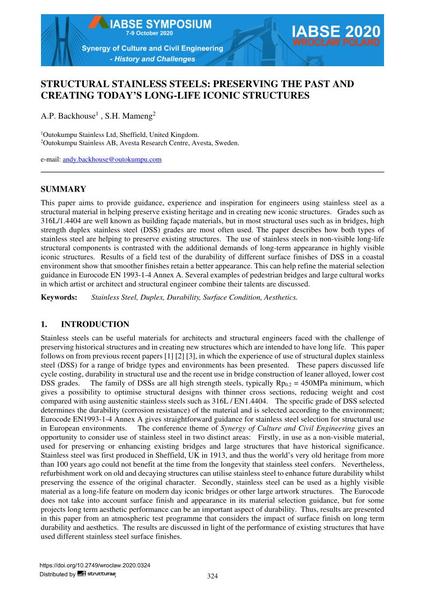Structural Stainless Steels: Preserving the Past and Creating Today’s Long-Life Iconic Structures

|
|
|||||||||||
Bibliographic Details
| Author(s): |
A. P. Backhouse
S. H. Mameng |
||||
|---|---|---|---|---|---|
| Medium: | conference paper | ||||
| Language(s): | English | ||||
| Conference: | IABSE Symposium: Synergy of Culture and Civil Engineering – History and Challenges, Wrocław, Poland, 7-9 October 2020 | ||||
| Published in: | IABSE Symposium Wroclaw 2020 | ||||
|
|||||
| Page(s): | 324-331 | ||||
| Total no. of pages: | 8 | ||||
| Year: | 2020 | ||||
| DOI: | 10.2749/wroclaw.2020.0324 | ||||
| Abstract: |
This paper aims to provide guidance, experience and inspiration for engineers using stainless steel as a structural material in helping preserve existing heritage and in creating new iconic structures. Grades such as 316L/1.4404 are well known as building façade materials, but in most structural uses such as in bridges, high strength duplex stainless steel (DSS) grades are most often used. The paper describes how both types of stainless steel are helping to preserve existing structures. The use of stainless steels in non-visible long-life structural components is contrasted with the additional demands of long-term appearance in highly visible iconic structures. Results of a field test of the durability of different surface finishes of DSS in a coastal environment show that smoother finishes retain a better appearance. This can help refine the material selection guidance in Eurocode EN 1993-1-4 Annex A. Several examples of pedestrian bridges and large cultural works in which artist or architect and structural engineer combine their talents are discussed. |
||||
| Keywords: |
aesthetics stainless steel durability Duplex Surface Condition
|
||||
